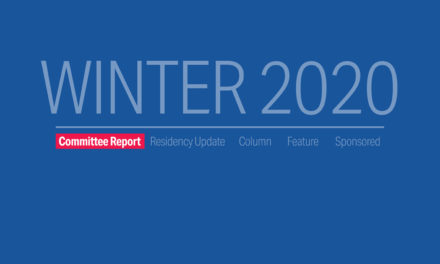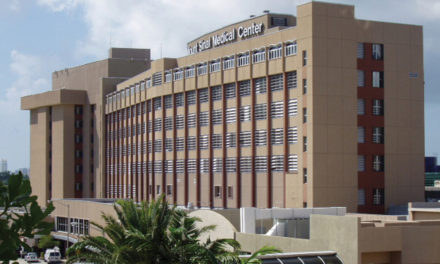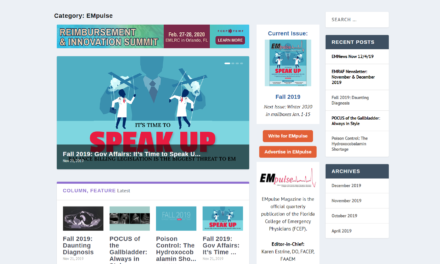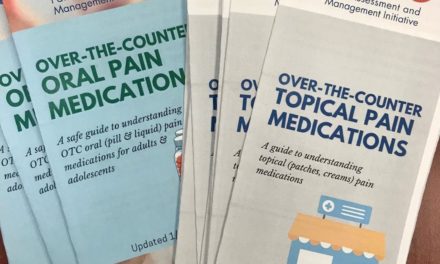As You Interview… Words of Advice from a Past-President
I believe that one of the hidden strengths of our specialty is our diversity—people, opinions, and approaches to solving problems. After all, isn’t that we do best as EM docs?
As it goes with print publishing, you are reading this article several months from when I wrote it. For me it’s Halloween, and I’m on the way home from ACEP19. It’s also interview season for graduating residents and fellows, so I want to share some thoughts that tie these two concepts together.
It was a great Council and Scientific Assembly for Florida EM docs. Dr. Bill Jaquis received the ACEP President’s gavel from Dr. Vidor Friedman. Dr. Kelly Gray-Eurom was elected to the Council Vice Speaker post, and the Jacksonville EM residents were the champions of SimWars. The Scientific Assembly boasted of hosting over 6,000 attendees from most states and multiple countries. I found it particularly invigorating to see the great variety of people in the sessions and walking the concourses.
I believe that one of the hidden strengths of our specialty is our diversity—people, opinions, and approaches to solving problems. After all, isn’t that we do best as EM docs? We attempt to solve problems for people who couldn’t figure them out for themselves. Sometimes these problems even involve medicine. I don’t know for sure, but I have the suspicion that we as a specialty reflect the patients we serve more than other specialties. This is relevant to our early-career physicians. Studies have demonstrated that diverse groups generally perform better on multiple dimensions of measurement. Additionally, patients feel more at ease, share a richer amount of history, and are more compliant with care plans when they share characteristics with their physicians. A word of advice for those interviewing: look for a job where you can feel comfortable with you colleagues—where you feel welcome. This applies to docs, NPs, and PAs. Emergency medicine is a team sport, so you need to feel like you can add to and grow with the team.
Having a welcoming and inclusive group is important. Another equally important feature to look toward is the leader. Years ago, when I was a med student, I was told not to choose a program based on famous faculty members or chairs because people inevitably move on to other positions. That may be true, but while they are there, the leader will have a significant impact on your professional life. A good leader works with you to make you a better clinician. For many, the leader is the one who shields them from the slings and arrows of outrageous hospital administrators. The truly wise leaders will be able to coach you and advise you so that you don’t become a target. Good leaders pass on messages; great leaders inspire their teams to excellence. For new graduates, be comfortable with the leader you are signing on with. For our middle- and late-career physician leaders, be the best leader that you can be. Keep working on your leadership skills even if you have been at it for years.
Another word of advice for our job seekers is to look for a work situation where you can branch out from the daily grind of shift work to explore additional areas of medicine. This will go a long way to strengthen your resilience to stress. We work in a demanding specialty—physically, cognitively, and emotionally. Look for a group where there is opportunity for growth, especially over the long-term of your career. In the first six months or so, you will still be getting comfortable in your new attending skin. Once you get past that and the Boards, look for other quasi-medical and full on medical areas to spread your wings and make a difference. Stress and burnout are widespread in our specialty. Some estimates say that up to half of emergency physicians are exhibiting signs and symptoms of burnout. As I’ve heard from several leaders in the field, you can’t yoga your way out of burnout. Look for a work situation that is supportive of you, and that can provide the supportive services to help get you through the rough spots. This applies regardless of where you are in your career path.
By the time you read this, the whole issue of balance billing will have been hashed out in Congress, or it would have been put on the back burner. Regardless, it was the elephant in the room at ACEP Council this year, and you might have been following the drama on social media. Unfortunately, it became a divisive issue in our specialty this past year. I say unfortunately because physicians are being assailed on all sides. Getting paid fairly by insurance companies should be something that we all can agree on. Getting patients out of the line of fire between insurance and physician companies is something that we can all agree on. To paraphrase our own Vidor Friedman, “point the barbs outward and not at each other.” The House of Emergency Medicine needs to stand together or it will surely fall apart.
In conclusion, we can all agree that our chosen specialty is challenging. It is also rewarding. We have the privilege to help people out on what they feel is their worst day. Most people don’t want to seek out our services, and sometimes we don’t get the respect that we deserve for all we have been through and all we do. However, there are those little bright spots that make it all worthwhile. To our early career colleagues looking for their first job, I wish you well. Don’t focus solely on the financial aspects of a potential position. Look for the intangibles as well. Those are the aspects that will make your professional life more rewarding and fulfilling. For the rest of you, be well and try to focus on the reasons that got you into our specialty. It will help get you through the rough patches. ■
This article is sponsored by Envision Healthcare.
This article is part of the following sections:






